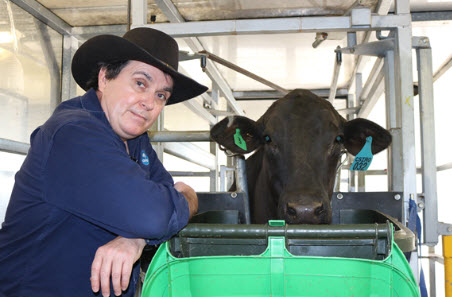Seaweed project targets methane emissions
18 September 2017

A trial that involves supplementing feedlot cattle with low levels of freeze-dried seaweed is underway to find the most economic and practical methane reduction options.
The MLA project, jointly funded by grainfed levies and the Australian Government, is being conducted at the CSIRO Lansdown Research Station near Townsville in consultation with the Australian Lot Feeders’ Association.
Dr Rob Kinley from CSIRO is trialling 90-day feedlot cattle on a seaweed supplement in an effort to reduce methane emissions.
“The cattle started on seaweed in early July and are currently being run through specially designed chambers to measure methane emissions,” Dr Kinley said.
The research is examining low levels of seaweed inclusion in steam-rolled barley-based feedlot diets.
Dr Kinley said initial research involved studying a large number of different types of seaweeds, looking for the most potent strain that proved to reduce methane produced in the gut of ruminants.
“Early in the process we found one – the Asparagopsis genus of seaweed – that under lab conditions, was immediately eliminating methane.
“The species showed that it produced a bioactive compound that inhibits the formation of methane in the gut, so the next logical step was to trial it on livestock.”
Dr Kinley teamed up with MLA as part of the National Methane Livestock Program in 2013 and first trialled it with sheep at the Floreat CSIRO facility in Perth.
“We fed it to animals on pelleted feed and sprinkled the dried seaweed on top and found that it worked better in the animal than in the lab, which is nearly unheard of,” he said.
The seaweed for the feedlot trial was wild harvested by researchers at James Cook University and then freeze-dried before being utilised as a powdered product.
Dr Kinley said a low inclusion rate of seaweed in feedlot diets is essential for the product to be commercially viable.
“Throughout the research project, we have had some concern about how the seaweed would be adopted on a financial level. We acknowledge that above all else, the expense of feeding livestock is the highest pinch-point for producers in the industry,” Dr Kinley said.
“Only needing a limited amount of the product would reduce costs on many levels, including transport.”
The 90-day trial will be completed in early October, with results available in early 2018.
To view the video on the effects of seaweed on methane emissions, click here.


